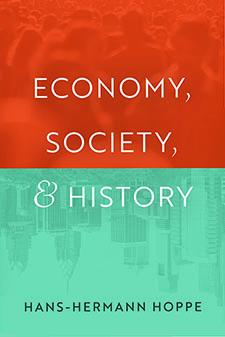
In June 2004, Professor Hoppe checked out the Mises Institute in Auburn to deliver an enthusiastic series of lectures titled Economy, Society, and History.
Over 10 lectures, one each early morning and afternoon for a week, Dr. Hoppe provided absolutely nothing short of a sweeping historic narrative and vision for a society rooted in markets and home. Delivered just from notes, to an audience of academics and intellectuals, the lectures revealed impressive depth and breadth.Even the most jaded scholars in the space were blown away by the erudition and scholarship of Hoppe’s discussion.
This job brings together the core of Hoppe’s life time of theoretical operate in one important and cohesive source. Here we discover provocative styles developed by Hoppe in the 1980s and 90s, especially in his essays discovered in A Theory of Socialism and Industrialism and The Economics and Principles of Personal Property. We likewise find his ravaging critique of democracy, made popular in his seminal book Democracy– The God That Stopped working.
We have actually taken the recordings, modified them, and put them into a printed book. As always, Hoppe is equipped– and unafraid– to deal with history, anthropology, approach, sociology, principles, politics, and economics, blending them into one meaningful thesis:
Chapter 1: The Nature of Male and the Human Condition: Language, Property, and Production Residential or commercial property established naturally, not synthetically, as a consequence of human action. What is the philosophical reason for private property, and what does property suggest for economics and justice?
Chapter 2: The Spread of People Around The Globe: The Extension and Increase of the Division of Labor
How did male evolve to develop trade and specialization? What did that mean for the advancement of society?
Chapter 3: Cash and Monetary Combination: The Growth of Cities and the Globalization of Trade
Money fixes issues of barter and trade; great cash makes worldwide economics possible. But money is constantly and permanently subject to damaging monopolization by states and reserve banks. How do we different money from the state, and different trade from politics?
Chapter 4: Time Preference, Capital, Technology, and Economic Growth
Time, and our choice for present items over future goods, informs everything we do. Low time choice, demonstrated by capital accumulation, is the crucial to advancing civilization. How do we encourage capital build-up when the forces of statism work against us?
Chapter 5: The Wealth of Nations: Ideology, Religious Beliefs, Biology, and Environment
How did the West get abundant? What intellectual movements threaten progress, or advance it?
Chapter 6: The Production of Law and Order: Natural Order, Feudalism, and Federalism
Must law be positive instead of evolved? Who develops it, and who imposes it?
Chapter 7: Parasitism and the Origin of the State
How did we get here? How does the gentility derive its putative authenticity, and what can the distant origins of governance teach us about the vast managerial social well-being states we endure today?
Chapter 8: From Monarchy to Democracy
Is democracy really the terrific advancement in human liberty we have been taught to believe? What is the function of natural and artificial elites?
Chapter 9: State, War, and Imperialism
States are always expansionist and bellicose. How do we tame their warring and intervening nature?
Chapter 10: Technique: Secession, Privatization, and the Potential customers of Liberty
Can personal covenant communities change the state? Why is a private property order morally urgent? Is secession practical? How do we move forward tactically?
As you can see, this book is a significant addition to Hoppe’s body of work, and an extremely important contribution to the “broad view” outlook for the West. Hoppe’s work is more crucial today than ever, given the fondness of contemporary administrative states to war, step in, tax, manage, debase, and normally ransack the engines of peace and civilization.
Economy, Society, and History is a blueprint for understanding the world, reconsidering it, and producing a better one.

